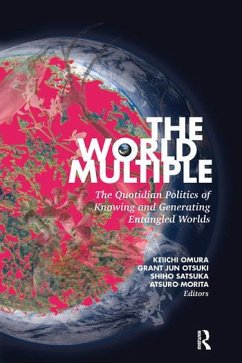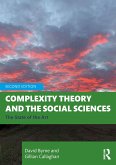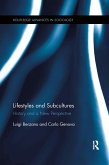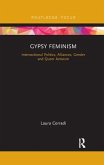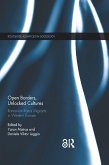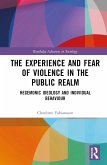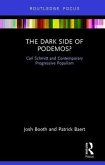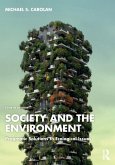The World Multiple
The Quotidian Politics of Knowing and Generating Entangled Worlds
Herausgeber: Omura, Keiichi; Satsuka, Shiho; Otsuki, Grant Jun
The World Multiple
The Quotidian Politics of Knowing and Generating Entangled Worlds
Herausgeber: Omura, Keiichi; Satsuka, Shiho; Otsuki, Grant Jun
- Broschiertes Buch
- Merkliste
- Auf die Merkliste
- Bewerten Bewerten
- Teilen
- Produkt teilen
- Produkterinnerung
- Produkterinnerung
Against the assumption that the world is a single universal reality that can only be known by science, this book argues that worlds are worlded - they are socially and materially crafted in multiple forms in everyday practices involving humans, landscapes, animals, plants, fungi, rocks, and others.
Andere Kunden interessierten sich auch für
![Complexity Theory and the Social Sciences Complexity Theory and the Social Sciences]() David ByrneComplexity Theory and the Social Sciences44,99 €
David ByrneComplexity Theory and the Social Sciences44,99 €![Lifestyles and Subcultures Lifestyles and Subcultures]() Luigi BerzanoLifestyles and Subcultures49,99 €
Luigi BerzanoLifestyles and Subcultures49,99 €![Gypsy Feminism Gypsy Feminism]() Laura CorradiGypsy Feminism25,99 €
Laura CorradiGypsy Feminism25,99 €![Open Borders, Unlocked Cultures Open Borders, Unlocked Cultures]() Open Borders, Unlocked Cultures59,99 €
Open Borders, Unlocked Cultures59,99 €![The Experience and Fear of Violence in the Public Realm The Experience and Fear of Violence in the Public Realm]() Charlotte Fabiansson (Australia Victoria University)The Experience and Fear of Violence in the Public Realm190,99 €
Charlotte Fabiansson (Australia Victoria University)The Experience and Fear of Violence in the Public Realm190,99 €![The Dark Side of Podemos? The Dark Side of Podemos?]() Josh BoothThe Dark Side of Podemos?80,99 €
Josh BoothThe Dark Side of Podemos?80,99 €![Society and the Environment Society and the Environment]() Michael S CarolanSociety and the Environment61,99 €
Michael S CarolanSociety and the Environment61,99 €-
-
-
Against the assumption that the world is a single universal reality that can only be known by science, this book argues that worlds are worlded - they are socially and materially crafted in multiple forms in everyday practices involving humans, landscapes, animals, plants, fungi, rocks, and others.
Produktdetails
- Produktdetails
- Routledge Advances in Sociology
- Verlag: Taylor & Francis Ltd
- Seitenzahl: 260
- Erscheinungstermin: 31. März 2021
- Englisch
- Abmessung: 236mm x 160mm x 23mm
- Gewicht: 430g
- ISBN-13: 9780367478056
- ISBN-10: 0367478056
- Artikelnr.: 60019888
- Routledge Advances in Sociology
- Verlag: Taylor & Francis Ltd
- Seitenzahl: 260
- Erscheinungstermin: 31. März 2021
- Englisch
- Abmessung: 236mm x 160mm x 23mm
- Gewicht: 430g
- ISBN-13: 9780367478056
- ISBN-10: 0367478056
- Artikelnr.: 60019888
Keiichi Omura is Professor in Anthropology at the Open University of Japan. He is the author of Kanada inuito no minzokushi: Nichij¿teki jissen no dainamikusu (Ethnography of Canadian Inuit: Dynamics of Everyday Practices ) (Osaka University Press, 2013). He is currently interested in the ethnographic study of Canadian Inuit language and knowledge, their subsistence, Inuit ways of life and social relations, and comparative studies of indigenous knowledge and modern science. Grant Jun Otsuki is Lecturer in Cultural Anthropology at Victoria University of Wellington, New Zealand. His research focuses on technology, cybernetics, and media in Japan and North America. He is currently finishing a book manuscript entitled Human and Machine in Formation: An Ethnographic Study of Communication and Humanness in a Wearable Technology Laboratory in Japan. Shiho Satsuka is Associate Professor of Anthropology at the University of Toronto, Canada. She is the author of Nature in Translation: Japanese Tourism Encounters the Canadian Rockies (Duke University Press, 2015). She is currently preparing a book manuscript tentatively entitled The Charisma of Wild Mushrooms: Undoing the Twentieth Century. Atsuro Morita is Associate Professor of Anthropology and Science, Technology and Culture at Osaka University, Japan. In the past several years he has been exploring the global network of hydrology and water management technology, particularly the travel of technologies, ideas, and expertise among Denmark, Japan, the Netherlands, and Thailand. In this research he is particularly focusing on simulation technologies and cultural imagination about landscape transformations in the Anthropocene.
Preface and acknowledgments 1. Introduction PART I: Entangled worldings 2.
Earth-beings: Andean indigenous religion, but not only 3. Vertiginous
worlds and emetic anthropologies 4. Doing and undoing caribou/atîku:
Diffractive and divergent multiplicities and their cosmopolitical
orientations 5. Maps in action: Quotidian politics through boundary
translational matrix for world multiple in contemporary Inuit everyday life
6. Climate change and local knowledge in Eastern Arctic Inuit society:
Perceptions, responses, and practice PART II: Space-time multiplicities 7.
Landscapes, by comparison: Practices of enacting salmon in Hokkaido, Japan
8. Spectral forces, time, and excess in Southern Chile 9. Temporalities in
translation: The making and unmaking of "folk" Ayurveda and bio-cultural
diversity 10. Healing in the Anthropocene PART III: Exploring quotidian
politics 11. Out of nothing: (Re)worlding "theory" through Chinese medical
entrepreneurship 12. Traveling and indwelling knowledge: Learning and
technological exchange among Vezo fishermen in Madagascar 13. Worlds apart?
Reflexive equivocations in the Alto Rio Negro 14. Translation in the world
multiple 15. A multispecies ontological turn Afterword
Earth-beings: Andean indigenous religion, but not only 3. Vertiginous
worlds and emetic anthropologies 4. Doing and undoing caribou/atîku:
Diffractive and divergent multiplicities and their cosmopolitical
orientations 5. Maps in action: Quotidian politics through boundary
translational matrix for world multiple in contemporary Inuit everyday life
6. Climate change and local knowledge in Eastern Arctic Inuit society:
Perceptions, responses, and practice PART II: Space-time multiplicities 7.
Landscapes, by comparison: Practices of enacting salmon in Hokkaido, Japan
8. Spectral forces, time, and excess in Southern Chile 9. Temporalities in
translation: The making and unmaking of "folk" Ayurveda and bio-cultural
diversity 10. Healing in the Anthropocene PART III: Exploring quotidian
politics 11. Out of nothing: (Re)worlding "theory" through Chinese medical
entrepreneurship 12. Traveling and indwelling knowledge: Learning and
technological exchange among Vezo fishermen in Madagascar 13. Worlds apart?
Reflexive equivocations in the Alto Rio Negro 14. Translation in the world
multiple 15. A multispecies ontological turn Afterword
Preface and acknowledgments 1. Introduction PART I: Entangled worldings 2.
Earth-beings: Andean indigenous religion, but not only 3. Vertiginous
worlds and emetic anthropologies 4. Doing and undoing caribou/atîku:
Diffractive and divergent multiplicities and their cosmopolitical
orientations 5. Maps in action: Quotidian politics through boundary
translational matrix for world multiple in contemporary Inuit everyday life
6. Climate change and local knowledge in Eastern Arctic Inuit society:
Perceptions, responses, and practice PART II: Space-time multiplicities 7.
Landscapes, by comparison: Practices of enacting salmon in Hokkaido, Japan
8. Spectral forces, time, and excess in Southern Chile 9. Temporalities in
translation: The making and unmaking of "folk" Ayurveda and bio-cultural
diversity 10. Healing in the Anthropocene PART III: Exploring quotidian
politics 11. Out of nothing: (Re)worlding "theory" through Chinese medical
entrepreneurship 12. Traveling and indwelling knowledge: Learning and
technological exchange among Vezo fishermen in Madagascar 13. Worlds apart?
Reflexive equivocations in the Alto Rio Negro 14. Translation in the world
multiple 15. A multispecies ontological turn Afterword
Earth-beings: Andean indigenous religion, but not only 3. Vertiginous
worlds and emetic anthropologies 4. Doing and undoing caribou/atîku:
Diffractive and divergent multiplicities and their cosmopolitical
orientations 5. Maps in action: Quotidian politics through boundary
translational matrix for world multiple in contemporary Inuit everyday life
6. Climate change and local knowledge in Eastern Arctic Inuit society:
Perceptions, responses, and practice PART II: Space-time multiplicities 7.
Landscapes, by comparison: Practices of enacting salmon in Hokkaido, Japan
8. Spectral forces, time, and excess in Southern Chile 9. Temporalities in
translation: The making and unmaking of "folk" Ayurveda and bio-cultural
diversity 10. Healing in the Anthropocene PART III: Exploring quotidian
politics 11. Out of nothing: (Re)worlding "theory" through Chinese medical
entrepreneurship 12. Traveling and indwelling knowledge: Learning and
technological exchange among Vezo fishermen in Madagascar 13. Worlds apart?
Reflexive equivocations in the Alto Rio Negro 14. Translation in the world
multiple 15. A multispecies ontological turn Afterword

